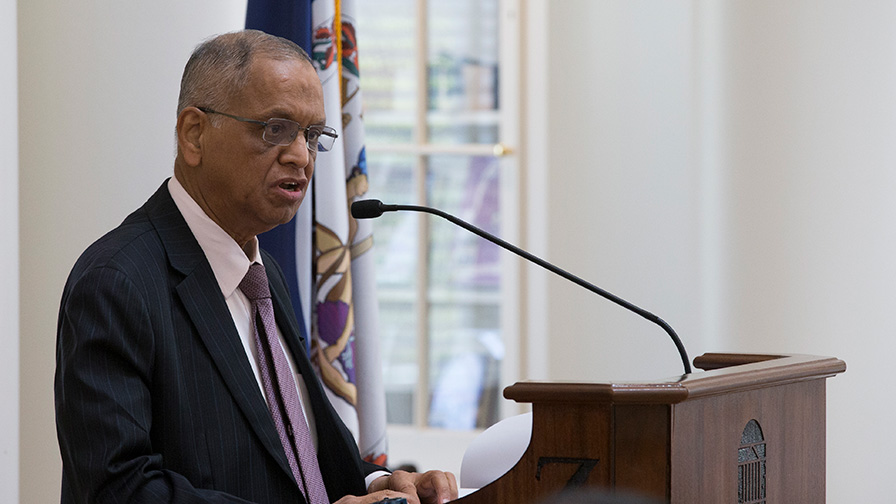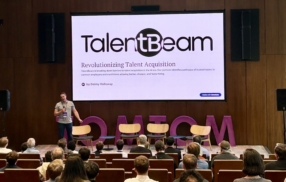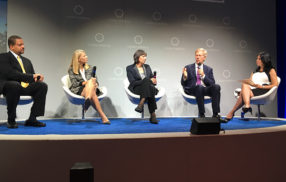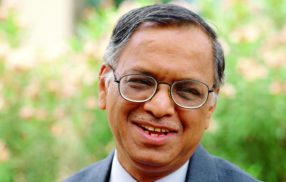
Infosys Founder Puts ‘Fairness’ Above All Else in Career as Legendary Entrepreneur
By Dave Hendrick
Infosys founder and former CEO and Chairman Narayana Murthy is a man of countless accomplishments, a legendary entrepreneur and committed philanthropist who is credited with helping to jumpstart an Indian technology boom that revolutionized industries.
Speaking at the University of Virginia Darden School of Business on 12 April, however, Murthy said he hoped his enduring legacy would be a commitment to basic human decency.
“I want a stone on my grave that says: ‘This was a fair person,’” Murthy said. “Fairness, to me, in every transaction, is extremely important.”
Indeed, Murthy presented the story of growing Infosys from six people and a $1,000 pool of capital into a multinational giant at the forefront of an ever-changing sector as a smooth one defined by values and fairness in his public talk with Dean Scott Beardsley in Darden’s Abbott Auditorium. The former CEO said a solid foundation with his supportive family, trusting colleagues and encouraging customers helped him remain positive about the company’s journey from inception to IT giant.
Murthy and Beardsley engaged in a wide-ranging discussion on technology, corporate governance and global affairs as part of the events commemorating the presentation of the 2017 Thomas Jefferson Foundation Medal in Global Innovation, which the Indian entrepreneur formally received on 13 April.
Considered one of the most influential global business leaders in the modern era, Murthy is credited with designing the “global delivery model,” a pioneering information technology approach. Today, the publicly traded consulting and IT company Infosys is one of the largest and most influential technology companies in the world.
The award, which is hosted by Darden and presented by UVA in partnership with the Thomas Jefferson Foundation at Monticello, recognizes an individual who embodies Jefferson’s vision of global citizenship and relentless dedication to human progress and innovation.
Coincidentally, Murthy said his father, a high school teacher, would often quote Jefferson when insisting that his children learn to cultivate the courage of their convictions.
Murthy credited his company’s explosive growth in part to an early ingrained value system that fostered “hope and trust” among its stakeholders and ultimately helped the company become one of India’s most-respected companies.
“Good governance is all about maximizing shareholder value while ensuring fairness, transparency and accountability to all stakeholders,” Murthy said, adding that shared trust inside and outside the company gave Infosys “the enthusiasm to achieve the impossible.”
A strong proponent of the social responsibilities of corporations, Murthy said every decision made by corporate leaders should first pass the basic filter of: “Will this decision of mine enhance respect for my company from society and will this decision of mine enhance respect for me from my employees?”
If such questions became fundamental to corporate decision-making, society would be happier and healthier, said Murthy, who at one point defined success as “the ability to put a smile on the face of people when I enter a room.”
The commitment to cultivating goodwill continues at Infosys today, Murthy said, claiming its corporate slogan — “Powered by intellect. Driven by values.” — continues to shape its hiring decisions.
“Anyone who wants a position at Infosys has to demonstrate intellect and values,” Murthy said. “Nothing else.”
Within the technology industry, Murthy looked ahead to a future of opportunity that was being informed by the key trends of increased automation and the consumer demand to access technology-assisted content “anytime, anywhere, on any device.”
While automation presents opportunities for companies at the presumed expense of huge numbers of employees, Murthy said he believed new solutions would emerge for workers.
“I am a great believer in the power of the human mind,” Murthy said. “What appears impossible today will be made a convincing possibility because of the human mind, and we have seen how the human mind has transformed this world from the Stone Age to where we are today. I don’t think that’s going to end.”
Murthy is the second recipient of the Thomas Jefferson Foundation Medal in Global Innovation, which was presented to Intel co-founder Gordon Moore in 2016.
The University of Virginia Darden School of Business prepares responsible global leaders through unparalleled transformational learning experiences. Darden’s graduate degree programs (MBA, MSBA and Ph.D.) and Executive Education & Lifelong Learning programs offered by the Darden School Foundation set the stage for a lifetime of career advancement and impact. Darden’s top-ranked faculty, renowned for teaching excellence, inspires and shapes modern business leadership worldwide through research, thought leadership and business publishing. Darden has Grounds in Charlottesville, Virginia, and the Washington, D.C., area and a global community that includes 18,000 alumni in 90 countries. Darden was established in 1955 at the University of Virginia, a top public university founded by Thomas Jefferson in 1819 in Charlottesville, Virginia.
Press Contact
Molly Mitchell
Senior Associate Director, Editorial and Media Relations
Darden School of Business
University of Virginia
MitchellM@darden.virginia.edu






